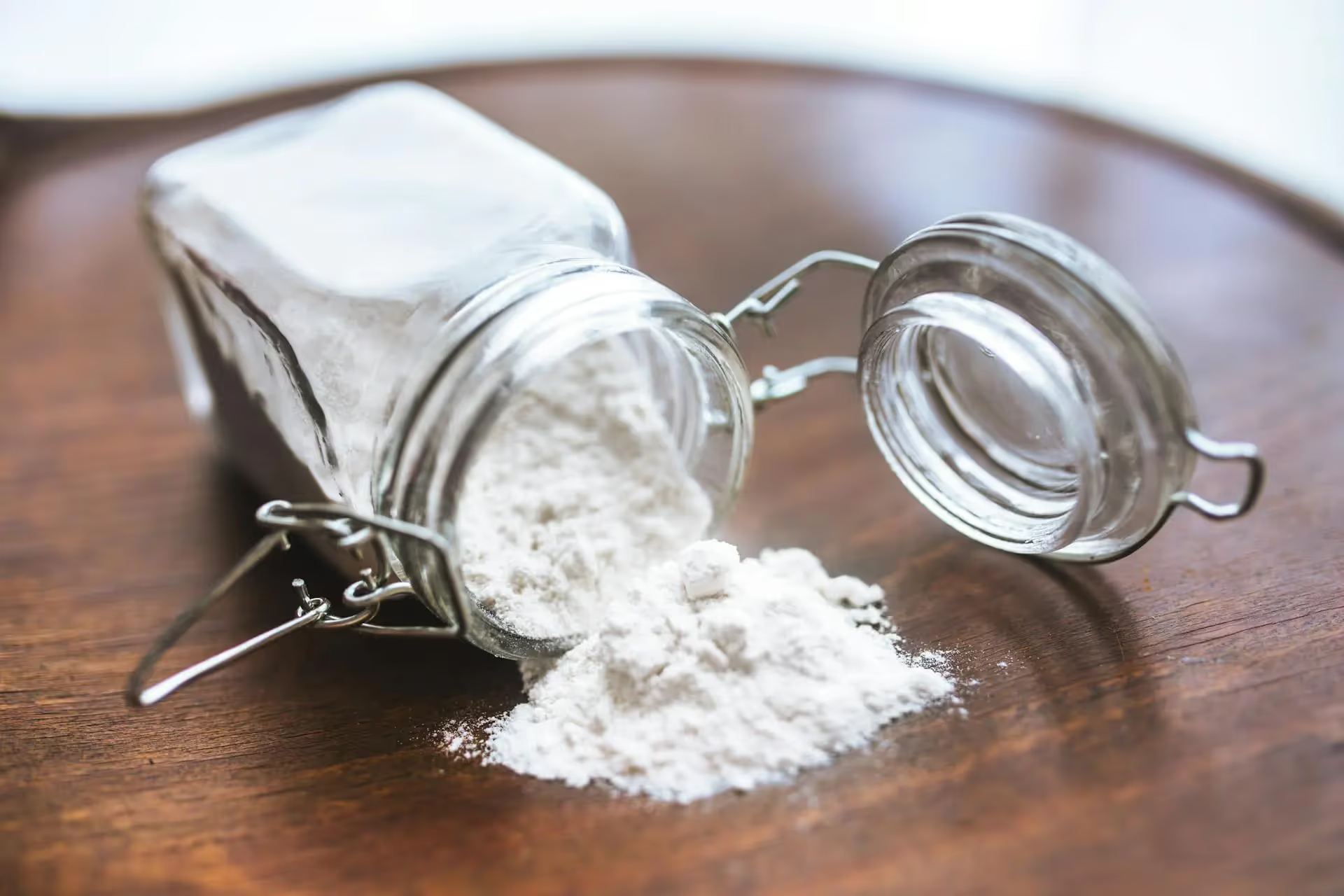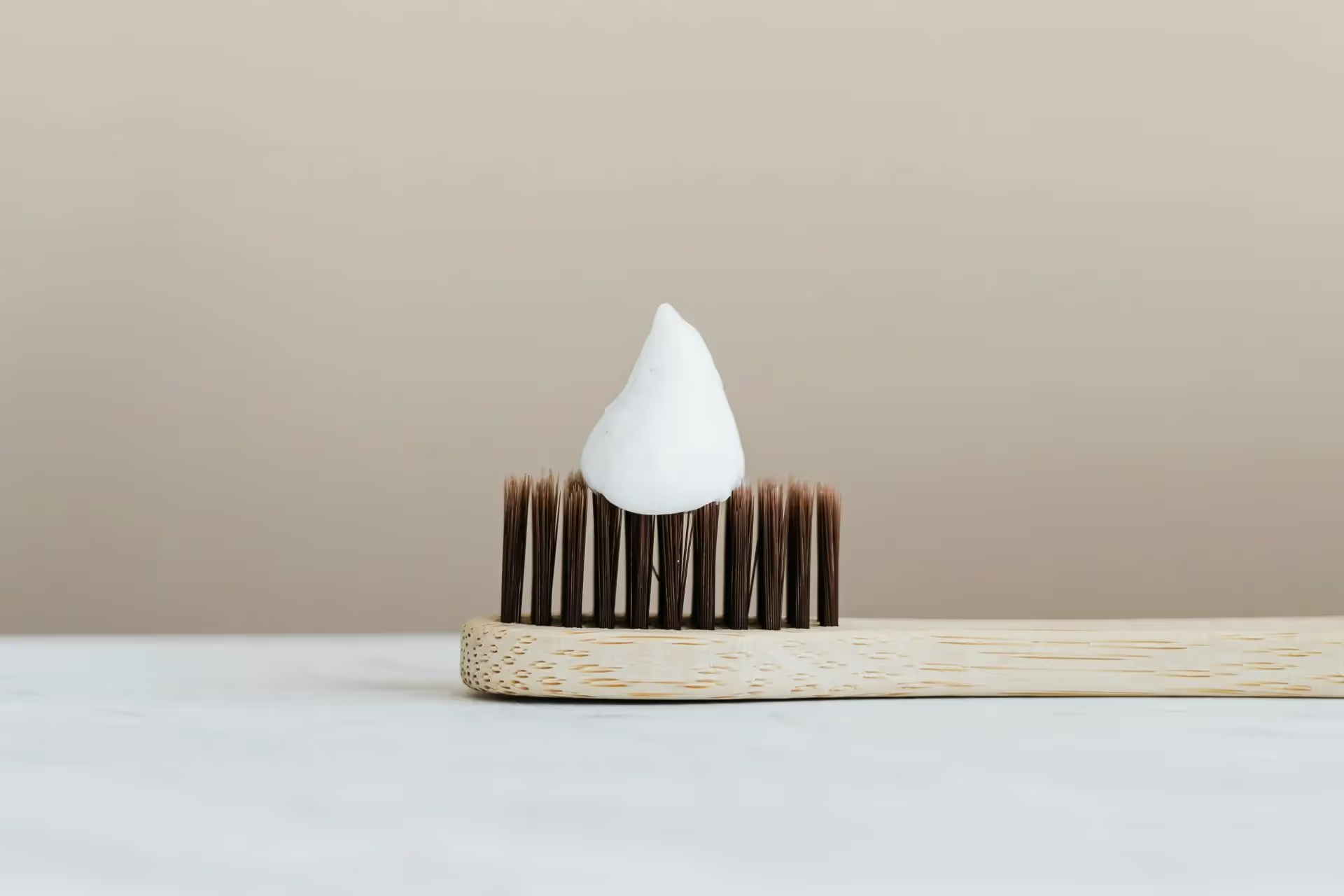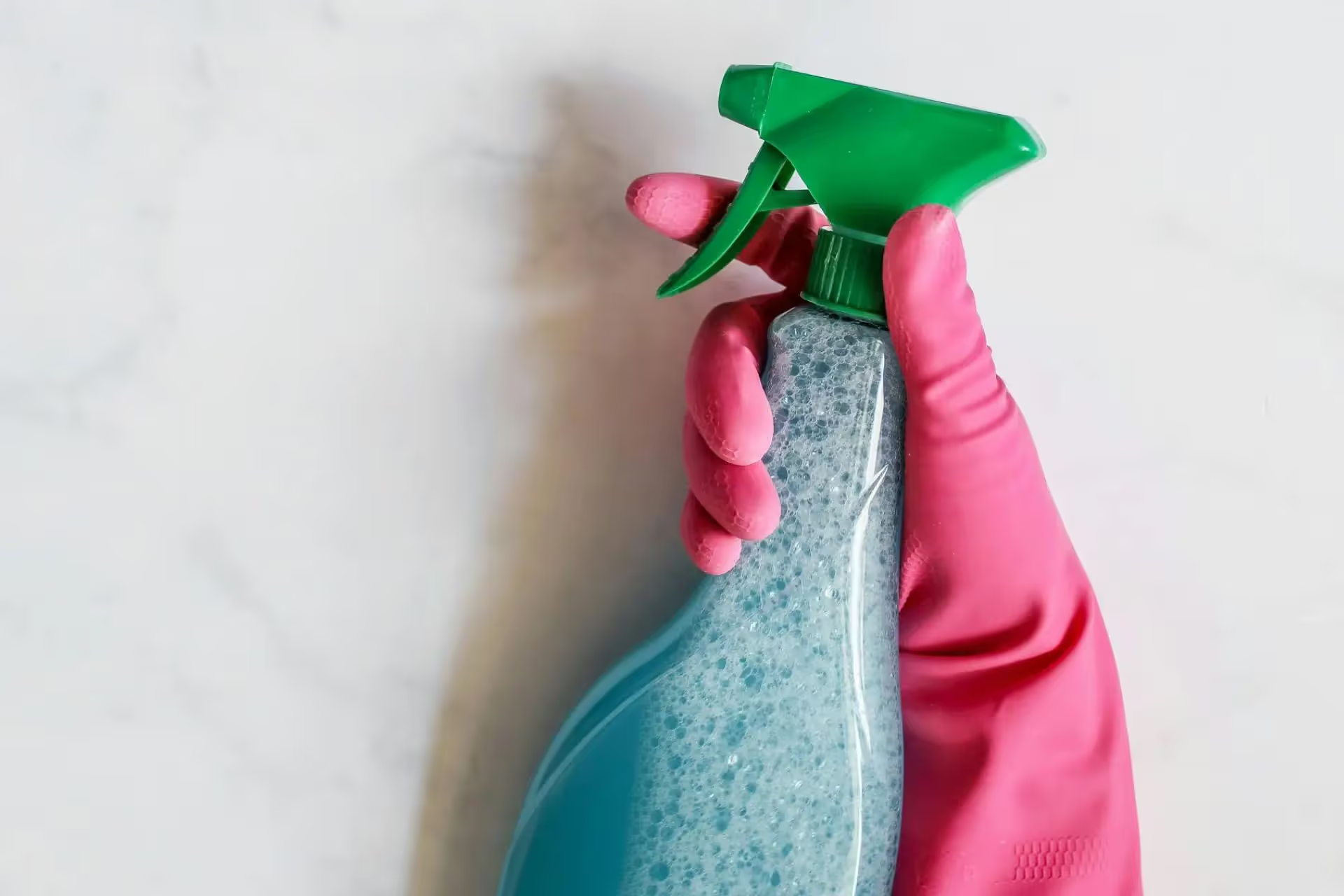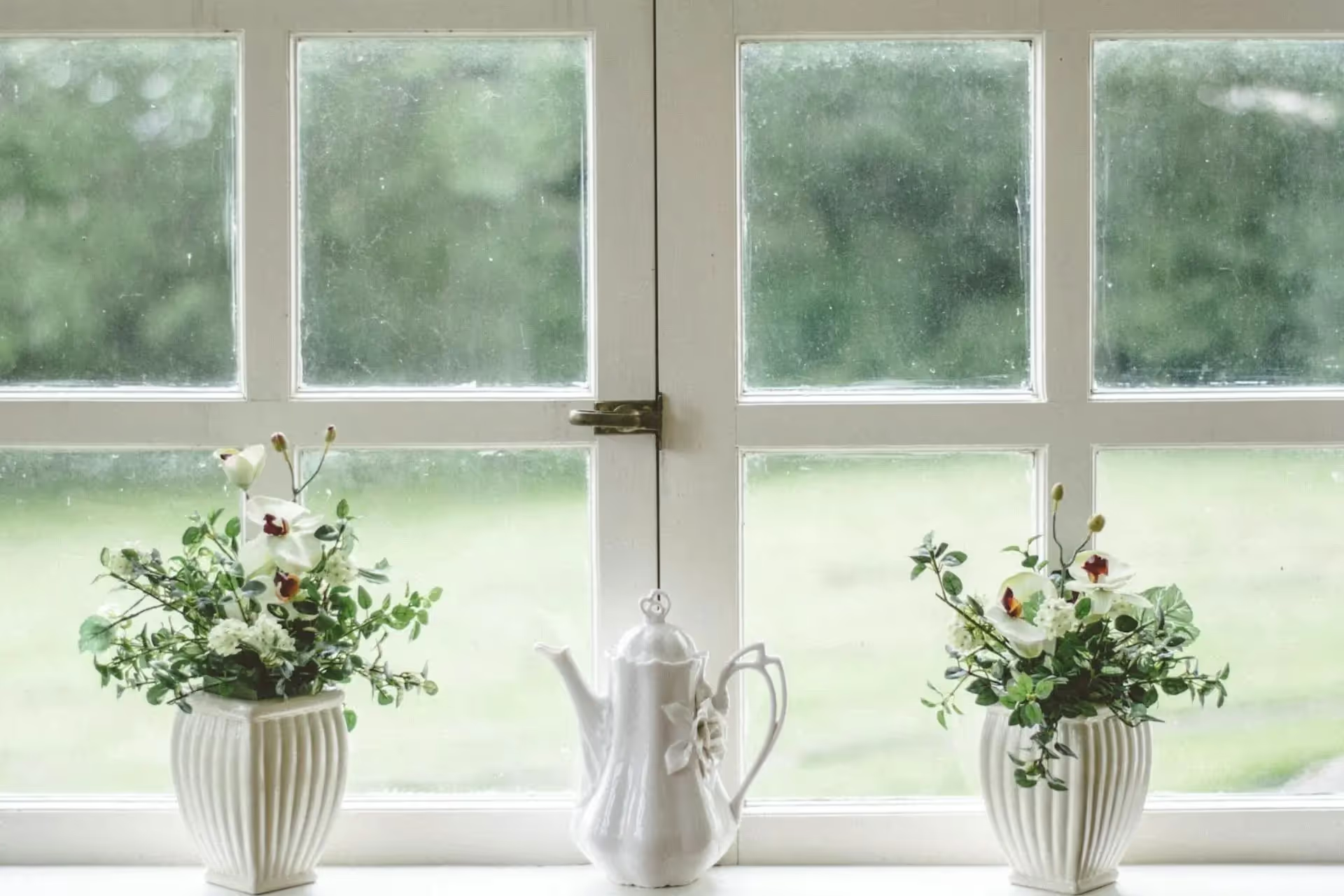To remove hard water stains from glass, use acidic solutions like white vinegar or lemon, or mild abrasives like baking soda and non-gel toothpaste. For tougher stains, try steam, glass polishing compounds, or commercial cleaners labelled safe for glass.
You just finished wiping your windows clean, but stubborn hazy patches remain. These spots, called hard water stains, form when water with high mineral content (e.g., rain shower or sprinkler spray) dries on glass surfaces. As the water evaporates, it leaves behind residue that creates white, chalky streaks.
It’s best to fix them early. Over time, these minerals will bake into the surface when exposed to sunlight, making them more stubborn. Here’s how to remove hard water stains from glass.
Distilled White Vinegar
White vinegar is a practical, accessible cleaning solution for light to moderate hard water stains. Its main ingredient, acetic acid, helps dissolve mineral deposits, such as calcium and magnesium, without damaging the glass. It’s a gentle option you can use regularly to keep surfaces clear and spot-free.
How to clean hard water stains on glass with vinegar?
- Mix equal parts white vinegar and warm water in a spray bottle.
- Spray directly onto the stained glass surface.
- Let the vinegar solution sit for around 5 to 10 minutes.
- Wipe with a clean microfiber cloth or soft sponge. To remove stubborn stains from glass, gently scrub in a circular motion.
- Rinse with water and dry thoroughly. Note that excess water will only cause more stains in the future.
Baking Soda Paste

Image Source: Pexels
The mildly abrasive texture of baking soda makes it an effective cleaner for scrubbing hard water stains from glass surfaces. For tougher marks, you can mix it with a bit of lime or lemon juice.
Unlike rougher abrasives like salt, baking soda won’t scratch. You can safely use your DIY baking soda scrub on sensitive surfaces, such as glass shower doors and bathroom windows.
How to remove hard water stains from glass with baking soda?
- Mix baking soda with a small amount of water to form a thick paste.
- Apply the solution directly to the stain using a soft cloth or sponge.
- Let it sit for 5 to 10 minutes to allow the buildup to loosen.
- Afterward, gently scrub the stains and then pat dry.
Toothpaste
Non-gel, non-whitening toothpaste contains mild abrasives that gently polish away mineral deposits, such as hydrated silica. They’re gentle enough for smaller spots or touch-ups. You’ll notice that it’s similar to baking soda but more convenient since you don’t have to mix paste from scratch.
Removing hard water stains from glass with toothpaste
- Apply a small amount to the stained area.
- Leave it there for 5 to 10 minutes.
- Wipe off with a damp cloth. If there’s residue, you can use an old toothbrush for gentle scrubbing.
- Rinse thoroughly and pat dry to prevent streaks.
Tip: Avoid gel-based or whitening formulas that are too slick or chemically harsh for glass.
Steam

Image Source: Pexels
If none of the above compounds work, try steaming the stains. They’ll be easier to wipe off once the heat softens the hardened mineral deposits. It’s a gentle, chemical-free approach. You’ll get the best results if you follow up with another cleaning method while the glass is still warm.
How to clean hard water stains on glass with steam?
- Run a handheld steam cleaner across the stained surface.
- For shower doors, you can also run hot water until the room steams up, then tackle the stains.
- Wipe down the loosened residue with a squeegee sponge.
Glass Polishing Compound
Glass polishing compounds are designed to buff out stubborn mineral buildup without scratching the surface. Professionals often use them in automotive and glass restoration projects, making them an excellent solution for older, set-in stains on exterior windows exposed to the elements.
That said, it’s not for everyday cleaning. Treat it as a last-resort alternative when all your natural solutions fail.
Removing Hard Water Stains with Glass Polishing Compound
- Clean the surface first with a natural solution to remove loose dirt or dust.
- Apply a small amount of polishing compound to the stained area using a soft cloth or felt pad.
- Buff in slow, circular motions using firm but gentle pressure.
- Continue buffing for a few minutes until the stain fades or the glass clears up.
- Wipe clean with a damp cloth and dry thoroughly.
Tip: Always test in a small corner first. Avoid using it on coated or tinted glass unless the product says it’s safe.
Magic Eraser for Spot Treatment
Magic Erasers are made of melamine foam, a micro-abrasive material that lifts off mineral buildup with just water. It’s ideal for small, stubborn spots that other solutions might have missed, such as the corners of specialty windows, faucets, sinks, or shower glass.
Just note that the compound is a bit harsh. Be extra gentle when applying it, or you might damage delicate finishes and coatings.
How to use Magic Eraser on hard water stains on glass?
- Dampen the Magic Eraser with water.
- Lightly rub the stained area using small, circular motions. Avoid applying too much pressure.
- Focus on the problem spots only.
- Rinse the glass with clean water to remove any residue.

Image Source: Pexels
Commercial Glass Cleaner
Commercial glass cleaners formulated for stubborn hard water stains often combine mild solvents and surfactants to break down mineral buildup and prevent streaking. Unlike abrasives or mechanical methods, these are ideal for large surface areas.
You can safely use them on various types of windows, but exercise caution with products that contain ammonia. They can react dangerously with other cleaners like bleach.
How to use commercial glass cleaner on water stains?
- Spray the product evenly across the glass surface.
- Let it sit for the recommended time.
- While wearing rubber gloves, wipe clean using a lint-free cloth.
- Repeat as needed for remaining patches.
- Finish with a dry wipe to remove streaks or leftover residue.
FAQs About How To Clean Hard Water Stains on Glass
In Summary
- Hard water stains form when mineral-rich water dries on glass, leaving behind white, chalky residue.
- Distilled white vinegar is a safe, everyday fix for light to moderate stains.
- Baking soda paste offers gentle abrasion for more stubborn buildup.
- Non-whitening toothpaste works like baking soda for quick spot-cleaning.
- Steam loosens tough stains without chemicals. It works best when paired with another method.
- Glass polishing compounds can restore older, etched glass when all else fails.
- Magic Erasers help with small, stuck-on spots but should be used with care.
- Commercial glass cleaners cover large areas fast, but avoid ammonia-based formulas.
Keep Your Windows Crystal-Clear With Long-Lasting Quality From Clera
No amount of cleaning would help if your windows are old, scratched, or poorly sealed. At Clera Windows + Doors, we manufacture and install high-performance, Energy Star-certified windows built for Ontario homes. Reach out for a free quote today and see the difference quality glass can make.








